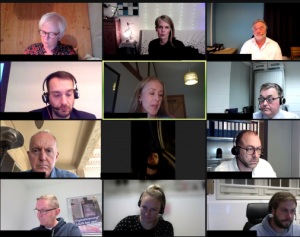News
How to be a cool employer that attracts and retains good staff
WYSE Travel Confederation Accommodation Members share tips and tactics for dealing with hospitality labour shortages during a Panel Connect Session Labour shortages have had severe impacts on hospitality businesses globally. Hostels and the broader youth travel accommodation sector have also felt these impacts. In an effort to share experiences and practices from WYSE Travel Confederation’s international network of hostels and youth travel accommodation providers, the WYSE Accommodation Sector Panel met online recently to discuss staffing challenges and solutions for their businesses.
Labour shortages have had severe impacts on hospitality businesses globally. Hostels and the broader youth travel accommodation sector have also felt these impacts. In an effort to share experiences and practices from WYSE Travel Confederation’s international network of hostels and youth travel accommodation providers, the WYSE Accommodation Sector Panel met online recently to discuss staffing challenges and solutions for their businesses.
Members from France, UK, USA, The Netherlands, Israel and Germany shared tried and tested tactics to the current challenge of labour shortage.
To start things off, WYSE Accommodation Sector Panel Member Etienne Matichard (JO&JOE) provided some broad context of the problem, a global one, to understand why workers have left the hospitality sector and where they have gone.
Clearly the pandemic highly affected the industry, but the real cause lies much deeper.
When tourism came to a complete halt and hospitality workers returned to their home countries, were furloughed, or made redundant, they started re-thinking their careers, shifted jobs temporarily and, with little evidence of uncertainty subsiding for travel, tourism and hospitality, decided to leave the sector for good. Some argue that the working conditions, with equivalent or higher salaries, were much better in other sectors, with regular working hours, more stability, lower physical demands, and social benefits.
“We never had to advertise for staff and now we only get one or two responses to a vacancy,” noted a hostel manager based in Europe.
According to an operator in the USA, the problems are similar there despite different government support schemes.
Accommodation providers based in the UK believe that they’ve been hit not only by the pandemic, but by Brexit: “the effect of Brexit is as great as COVID-19 when it’s about labour shortage”.
What can employers in the youth travel accommodation sector do about the staffing challenges that abound?
“It is good to know that others have these problem too,” remarked a European hostel operator. “Sometimes you think, ‘what are we doing wrong? what could we do differently?’ and this session has been very helpful in realising we have similar problems.”
Here are some of the approaches shared by the youth travel accommodation Members that joined the session:
- Increase wages to attract and retain the best staff and to compete with other employers
- Try all resources and recruit:
- Casual students
- Past team members
- Friends, family and others interested to work
- Financial incentives:
- A hiring bonus for new employees. To retain new staff, split the bonus over a set period of time
- A referral bonus for existing staff who recruit new employees
- A bonus to convince them to stay longer or until the lockdown is over
- Add-ons to wage packages, such as a room and board
- Flexible working arrangements:
- Flexible hours: hire part-time staff or split roles to increase flexibility
- Flexible location: temporary re-location at different properties, utilise existing staff to train new staff
- Shorten the recruitment process on entry level roles:
- Appoint buddies in recruitment activities to help speed up the process
- Make sure all candidates, even those declined, receive a timely response
- Implement pro-active screening calls and ask the question if they are considering other employers
- Stand out in advertising positions:
- Involve your marketing staff in making advertisements more noticeable
- Create different and unique names for positions, use striking adjectives to attract more interest
- Use paid ad campaigns on Facebook and Instagram instead of LinkedIn
- Focus on why you are a good place to work and emphasize equity, diversity and inclusion in your workplace if appropriate to your company ethos
- Demonstrate that you are a “cool” employer and a fun place to work:
- Organise staff events
- Communicate your organisation’s views and actions on environmental, social and governance (ESG) and diversity, equity and inclusion (DEI)
- Offer support and incentives to your staff to stimulate ideas and keep them engaged
- Try to retain existing staff and be as flexible as possible with study hours, hobbies, childcare, and other personal needs
- Outsource recruitment for roles that are particularly hard to fill, like housekeeping or maintenance.
- Use technology
- Online pre-check in
- Un-staffed food & beverage outlets
“Thank you for your energy and effort, said Pieter van der Zeeuw (Hans Brinker Hostel), WYSE Accommodation Sector Panel Chairperson. “It was a very interesting session and hopefully we can build on it for the STAY WYSE Conference.”
“It was great to hear from other industry leaders and know we are all in this together, remarked Louise Garner (Clink Hostels), Member of the WYSE Accommodation Sector Panel. “Always something new to be learned – good session.”
Thank you to all those who joined for sharing your challenges and solutions. Also, don’t forget to make use of the WYSE Jobsboard. WYSE Members can post vacancies free of charge.
Join WYSE Travel Confederation
If you’d like to join WYSE Travel Confederation and benefit from new connections, free access to industry research, informative webinar sessions, discounts on industry events and brand exposure within the youth and student travel industry, click below to view our membership options and find out more.
